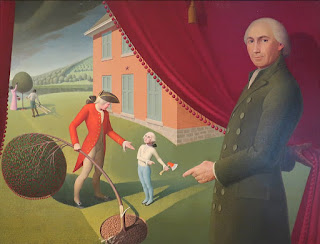Serving from 1977-1981, Jimmy Carter was our nation's 39th president. When he passed away earlier this year, I was reminded of his extraordinary life. His humanitarian work with the Carter Center and Habitat for Humanity almost overshadowed his presidency. Maybe that was by design, after all, he opened his farewell address with the words:
"In a few days I will lay down my official duties in this office, to take up once more the only title in our democracy superior to that of President, the title of citizen."
He was right, as citizens we are the ones who are truly in charge. The President, Congress, and all of the various state and local elected officials work for us. It is up to us as citizens to hold them accountable to our nation's ideals that have been illustrated in the Declaration of Independence and the Constitution of the United States and expanded through the the last 237 years of legislation, policy, and shared experiences.
 |
| Jimmy Carter's Official Portrait by Robert Templeton |
The quote I chose for this year's picture, "We must adjust to changing times and still hold to unchanging principles", came from Carter's Inaugural Address, but he attributed it to his high school English teacher, Miss Julia Coleman. (Please follow the link to read about this remarkable educator). It is the unchanging principles of our country such as "all men are created equal" from the Declaration of Independence and the reasons given for "We the People" to establish the Constitution: "to form a more perfect Union, establish Justice, insure domestic Tranquility, provide for the common defense, promote the general Welfare, and secure the Blessings of Liberty to ourselves and our Posterity" that have allowed our country to adjust to changing times and expand the blessings of liberty to those who were denied them in our country's past.
It feels like our unchanging principles are currently under attack as our current president is fixing blame and sowing division. The separation of powers and systems of checks and balances established in the Constitution are being ignored as the unofficial Department of Government Efficiency hobbles and remakes our government institutions.
"For American democracy to endure, we must demand that our leaders and candidates uphold the ideals of freedom and adhere to high standards of conduct."
That quote comes from one of Jimmy Carter's last published writings, a New York Times opinion titled "I Fear for Our Democracy." In it, he lists five things that we must do to preserve our country including resisting polarization and stopping the flow of disinformation. Just as some of his most important work was done as a citizen, these essential tasks need to be the work of us, the citizens of the United States.
A few notes about this year's portrait: We tried to recreate an image from Jimmy Carter's February 2, 1977 address to the nation. I had just the right outfit in my closet (having found the sweater just a few days after Carter's passing). I wasn't able to find a location that would be a suitable stand-in for the White House library, so Sarah digitally inserted the background and aged my photo to match. As always, this photo series is the work of my human family - no artificial intelligence is involved.
You can see the changing times through my past portraits

.jpg)















